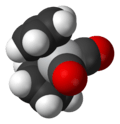Titanocene dicarbonyl
From Wikipedia, the free encyclopedia
| Titanocene dicarbonyl | ||
|---|---|---|
2.png) | ||
 | ||
| IUPAC name dicarbonylbis (η5- cyclopentadienyl) titanium | ||
| Other names Dicarbonyldi- π-cyclopentadienyltitanium | ||
| Identifiers | ||
| CAS number | 12129-51-0 | |
| Properties | ||
| Molecular formula | C12H10O2Ti | |
| Molar mass | 234.09 g/mol | |
| Appearance | maroon solid pyrophoric | |
| Melting point | 90 °C | |
| Boiling point | Sublimes40-80 °C @0.001 mm Hg | |
| Solubility in water | insoluble | |
| Solubility in other solvents | THF, benzene | |
| Structure | ||
| Coordination geometry |
tetrahedral | |
| Hazards | ||
| Main hazards | flammable | |
| Related compounds | ||
| Related compounds | Cp2TiCl2 | |
| Except where noted otherwise, data are given for materials in their standard state (at 25 °C (77 °F), 100 kPa) | ||
| Infobox references | ||
Dicarbonylbis(cyclopentadienyl)titanium is the chemical compound with the formula (η5-C5H5)2Ti(CO)2, abbreviated Cp2Ti(CO)2. This maroon-coloured, air-sensitive species is soluble in aliphatic and aromatic solvents.[1] It has been used for the deoxygenation of sulfoxides, reductive coupling of aromatic aldehydes and reduction of aldehydes.
Structure and synthesis
Cp2Ti(CO)2 is prepared via the reduction of titanocene dichloride with magnesium under an atmosphere of carbon monoxide.[2]
- (C5H5)2TiCl2 + Mg + 2 CO → (C5H5)2Ti(CO)2 + MgCl2
Both Cp2Ti(CO)2 and Cp2TiCl2 are tetrahedral as are related zirconium and hafnium compounds.
References
- ↑ Sikora, D.J.; Moriarty, K.J.; Rausch, M.D. (1990). "Reagents for Transition Metal complex and Organometallic syntheses." Inorganic Sytheses. 28. pp. 250-251.
- ↑ "Dicarbonylbis(cyclopentadienyl)titanium". Encyclopedia of Reagents for Organic Synthesis. John Wiley & Sons, Ltd. 2001. doi:10.1002/047084289X.rd073.
| |||||||||||||||
This article is issued from Wikipedia. The text is available under the Creative Commons Attribution/Share Alike; additional terms may apply for the media files.